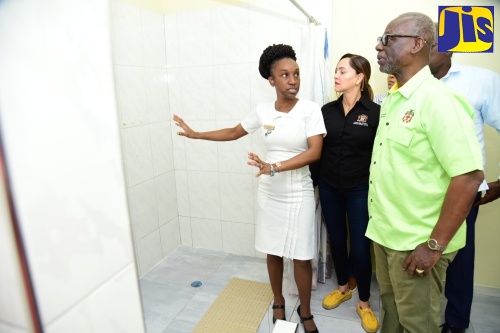Gov’t Safeguarding Jamaica’s Most Vulnerable
By: , May 31, 2024The Full Story
The Government has remained steadfast in its commitment to implementing policies that promote social cohesion, reduce inequality, and enhance the quality of life for all Jamaicans.
Prime Minister, the Most Hon. Andrew Holness, says that the Government cannot afford to sacrifice the well-being of the most disadvantaged citizens in the pursuit of short-term gains.
“We must uphold our responsibility to protect the poor and vulnerable,” he points out.
To this end, in 2021, the Government introduced the Social Pension Programme, providing a guaranteed income for vulnerable Jamaicans. aged 75 and older, who are not National Insurance Scheme (NIS) contributors and who are not in receipt of a pension.
Mr. Holness said this year’s Budget increased the allocation for the social pension by 65 per cent, and effective May 2024, the benefit payment, which is disbursed bimonthly, has been moved from $6,800 to $12,000.
As at May 2024, approximately 13,000 elderly persons benefit from the programme.
Prime Minister Holness also mentions that the annual pension exemption and age relief exemption have been increased from $80,000 to $250,000 for each exemption, providing significant relief from taxes and putting more money in the pockets of the pensioners.
“Effective April 1, 2023, pension benefits under the NIS increased by 23 per cent from $3,400 to $4,200 per week for the full-rate pensioners. The benefit for the three-quarter-rate pensioners increased by 37 per cent from $2,550 to $3,500 per week,” he states.
He further notes that half-rate pensioners saw a 76 per cent increase from $1,700 to $3,000 per week.
In addition, since 2016, the minimum wage has moved from $6,200 to its current $13,000, representing a 110 per cent increase over the seven-year period.
Mr. Holness also informs that effective June 1, the minimum wage will be increased once more, from its current $13,000 to $15,000 per week.
Regarding the Programme of Advancement Through Health and Education (PATH) a total of $6.03 billion was expended on benefit payments, as of December 2023, with $372 million spent on back-to-school expenses for 106,000 students.
He says that 458 clients from PATH households received entrepreneurship grants under the Steps to Work Programme, totalling $73.2 million.
This year’s Budget has increased the allocation to PATH by approximately 30 per cent, Mr. Holness adds.
In the meantime, Mr. Holness informs that in the coming year, to ease the electricity bill burden on public-sector retirees, the National Housing Trust (NHT) will expand its Home Grants to include the installation of solar panel systems on the houses of qualifying public-sector pensioners, up to a maximum of $1.5 million each.
In addition, the New Social Housing Programme, was created to improve housing conditions for the poor and indigent population.
“Over 200 houses have been built under the programme, with additional homes at varying stages of construction. We aim to construct 500 social housing solutions this fiscal year,” the Prime Minister says.
In the meantime, the Jamaica Council for Persons with Disabilities (JCPD) provided Rehabilitative Grant support valued at $21,926,180.75 to 382 persons with disabilities.
Also, the Registrar General’s Department (RGD) began issuing birth certificates in Braille on May 1, 2024.

For homeless individuals, the NHT, in partnership with the Ministry of Local Government and Community Development, will construct 14 homeless shelters on government lands across Jamaica.
In addition, new male wards have been built at the St. James and Portland infirmaries, costing $45 million each and at the St. Ann’s Bay Infirmary, $50 million was allocated for renovations.
The Falmouth Homeless Shelter in Trelawny was opened at a cost of $25 million; the Ocho Rios Night Shelter in St. Ann was opened to accommodate the homeless; and a drop-in centre and night shelter, adjacent to the Clarendon Infirmary, was opened.

Mr. Holness informs that phase two of the Desmond McKenzie Transitional Centre for the Homeless in downtown Kingston commenced to increase its occupancy to 100.
Meanwhile, the Prime Minister says that the Government will be strengthening the social safety net by introducing unemployment insurance.
“Losing your job through no fault of your own, even for a short time, can place you and your dependents at risk. You will recall that 150,000 of our Jamaicans lost their jobs during the COVID pandemic,” Mr. Holness says.
He notes that during that period, the Government stepped in with the COVID-19 Allocation of Resources for Employees (CARE) programme, which cushioned the blow and prevented most households affected from falling into poverty.
“The unemployment insurance will ensure that our Jamaican households will maintain a minimum standard of living during a period of unemployment of the breadwinner,” Mr. Holness says.




